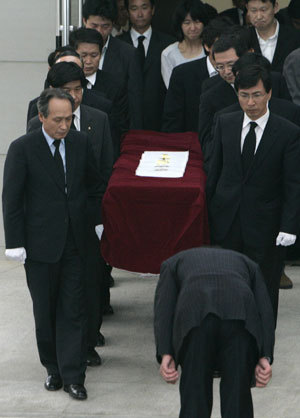Former South Korean President Roh Moo- hyun died of external head injury after falling down a mountain around 9:30 a.m. (0030 GMT) Saturday amid an investigation into a bribery scandal involved him and his family.
 |
|
People carry a coffin containing the dead body of former South Korean President Roh Moo-hyun as a man (front) bows to Roh at a hospital in Yangsan, about 430 km (267 miles) southeast of Seoul May 23, 2009. Former South Korean President Roh Moo-hyun died of external head injury after falling down a mountain at around local time 09:30 (0030 GMT) Saturday.
|
EX-PRESIDENT'S APPARENT SUICIDE
The ex-president is known to have jumped off a cliff near his home around 6:40 a.m. Saturday (2140 GMT Friday) while he was taking a hike with his guard.
Roh had severe external head injuries and died after having been moved to a larger hospital in Busan from his hometown of Gimhae.
It is not yet confirmed whether the former president committed suicide, but as a brief suicidal note was found on his personal computer after his death, a suicide seems more likely, according to local media.
The suicidal note was mostly about how troubled he and his people had been and asked to erect a small tombstone near his hometown.
The ex-president's funeral is expected to be held at Bongha Village, some 450 kilometers south of Seoul, where Roh had been living since his retirement in February last year, aides said.
Roh served as South Korea's president from 2003 to 2008.
BRIBERY SCANDAL INVESTIGATION LIKELY TO END
South Korean Justice Minister Kim Kyung-han said hours after the death was reported that the government was likely to close the investigation into the bribery scandal the former president and his family were involved in as the ex-president was already dead.
The ex-president had been under the South Korean prosecution on a bribery scandal involving his wife, Kwon Yang-sook, and son.
His wife and son had been alleged for accepting around 6 million U.S. dollars from Park Eon-cha, head of shoe manufacturer Taekwang Industry, during his five-year presidential term.
Investigators were suspecting Roh was the intended recipient of the money.
Roh already made a public confession that his wife received money from Park, who was charged with bribing former government officials with money worth millions of U.S. dollars.
Although Roh denied his involvement in the scandal, claiming he learned of the money transactions only after he retired, he became the third former South Korean president who had been summoned and questioned by prosecutors for alleged corruption.
As Roh had been renowned for a "clean-politician" image, he had gone through mounting stress from the ongoing probe, which tainted his image, aides told local media.
S. KOREAN SOCIETY GRIEVES OVER ROH'S DEATH
S. Korean President Lee Myung-bak expressed deep regrets over his predecessor Roh Moo-hyun's death, calling it a national tragedy as he was reported of the news.
S. Korea's former presidents, including Kim Dae-Joong, Kim Young-sam and Chun Doo-hwan, also expressed shock and sadness at the death of Roh Moo-hyun.
South Korea's business groups also expressed regret over the death, hoping that it would not have a negative impact on the economy.
The public in South Korea also mourned the former president's death, with major Web portals filled, within hours, with tens of thousands of posts expressing grief and astonishment.
Meanwhile, hundreds of Roh's supporters and lawmakers of the main opposition Democratic Party expressed anger at prosecutors and local media organizations for having conducted an " unreasonable and indiscriminate" investigation into Roh's family and biased reports on the case, which jointly led the former president to commit suicide.
Some 800 supporters of Roh gathered in downtown area of Seoul on Saturday afternoon and briefly clashed with police while attempting to install an altar in memory of the late president, as the police worried over a possible protest.